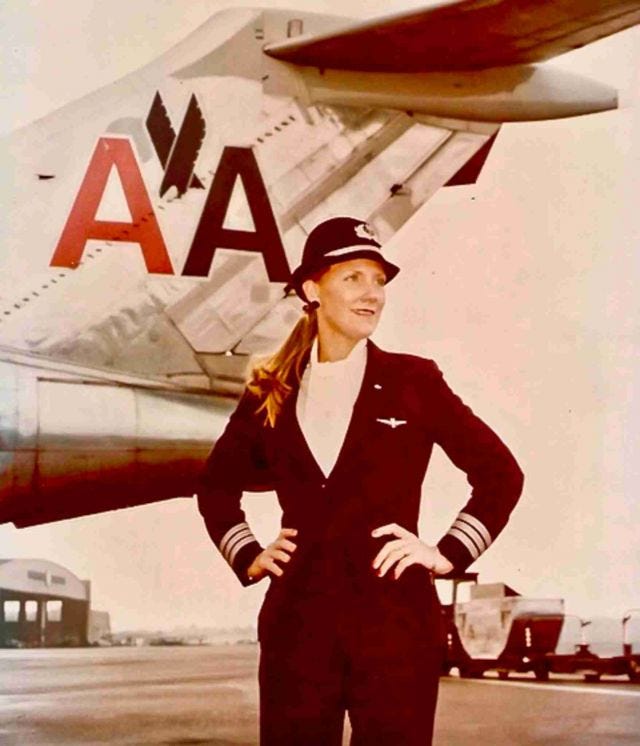Lady Business: ‘Flying by the seat of her panties’ and other airborne indignities
Hello and welcome to Lady Business, a newsletter about women, the business world, and all the ways they overlap. You can sign up for Lady Business and read previous issues here. This is the 94th issue, published March 1, 2020.

First in Flight
“We were ready to write Beverly Bass: The Musical.”
A few weeks ago I finally saw Come From Away, the hit musical about September 11, which manages to be both less depressing and less exploitative than I expected. (Which I know sounds like damning with faint praise, but it’s really an impressive accomplishment! There is a LOT of shitty, manipulative fiction about 9/11 out there. Looking at you, The Emperor’s Children!)
My favorite part of the play, no surprise, was the character who’s the closest thing to the ensemble story’s protagonist: Beverly Bass, the real-life pilot who in 1986 became American Airlines’ first female captain and who, 15 years later, found herself flying a 777 from Paris when the terrorist attacks in New York closed American airspace. Bass captained one of 38 planes that were grounded in small-town Canada for days, waiting out the immediate aftermath of the attacks that turned “the one thing I love more than anything … [into] the bomb,” as her character sings in the play’s only solo number.
The writers of Come From Away developed the show from interviews they conducted with people who had been on the planes and in Newfoundland during that week. And as they said in later conversations, they found Bass’s story almost compelling enough to write a musical only about her. Which I kind of wish they had done! It’s a pretty singular story, still: Almost half a century after the major airlines started, very slowly, allowing women into their cockpits, only about 5 percent of commercial airline pilots are women. And that’s a big improvement in just the past decade, according to the International Society of Women Airline Pilots (an organization Bass cofounded).
The first women pilots got to face all the usual fun stuff. There was the institutional skepticism and misogyny and hazing, of course, and not only from male pilots: When American Airlines’ Bonnie Tiburzi in 1973 became the first female pilot for a major commercial carrier, the Los Angeles Times reported her accomplishments under the headline “Airline Pilot to Fly by Seat of Panties.” But just to be eligible for such professional disrespect, women needed to work twice as hard as their male peers: In order to get American Airlines to take her application seriously, Bass had to build up her flight hours by flying old, poorly-maintained and radar-less freight airplanes through a dangerous region known as “Thunderstorm Alley.” “We would never fly a passenger plane like that,” she later said. “But it’s what many of us do to build our flight hours [in order] to get hired by the airline.”
Once a few women started making it into the pilots’ seats, the airlines weren’t opposed to using them for a little feelgood publicity -- sometimes without allowing the women to speak for themselves. This 1973 New York Times article about Tiburzi’s landmark accomplishment is kind of hilariously based on interviews with airline personnel and Tiburzi’s father (?!?) but not the woman herself: “American Airlines, while wishing her not to give any interviews or press conferences until the breaking‐in period is completed, is just delighted to talk about her. … Miss Tiburzi is a publicity man's dream.”
Yet “publicity men” would only do so much work for these women, who sometimes even had to organize their own PR stunts. As Come From Away mentions, in 1986, Bass made headlines by captaining the first commercial flight to be crewed entirely by women. She and the other women rearranged their schedules and organized the milestone flight on their own: “American officials say the company did not deliberately schedule the women to make the trip together and had no plan to make aviation history,” UPI reported at the time.
Three decades later, some things have gotten better for women in the air, and some haven’t. Female pilots have spent the past several years lobbying and suing for better -- or any -- maternity leave policies, not to mention accommodations for nursing mothers who need to pump breast milk while in the air. (All of which are problems that have long plagued the women who are the majority of flight attendants.)
So, sure, Breast Pumping in the Airplane Bathroom might not be an obvious next Broadway hit. But I’d pay good money to see more stories about women like Bass, or Tiburzi, or Jerrie Cobb, or Bessie Coleman. So would large audiences, if the profitable track records of Come From Away and Hidden Figures are any example. And in the week that we’re celebrating the life of Katherine “Hidden Figures” Johnson, it seems pretty obvious that I’m not the only one hungry for more fiction about the many fascinating and still lesser-known heroines of aviation.
Lady Bits
-“I have lost hope that hearing women’s stories will ever make even one man realize that what seemed like an ordinary night of his life was a life-changing horror story from the perspective of the woman involved.” (I don’t actually feel this despairing right now, in this week of Harvey Weinstein’s conviction as a rapist, but Emily Gould’s reflections on Gawker and beyond are compelling.)
--“The lyricist Stephen Sondheim at first expressed doubts about his fitness for the project: ‘I’ve never been that poor and I’ve never even met a Puerto Rican.’” And other reasons to rethink West Side Story.
--Samin Nosrat, always a great interview.
Thank you for reading, commenting, and subscribing to this newsletter! Please tell your friends to sign up here, let me know what you think about this week's issue, and what else you'd like to see me write about: maria.aspan@gmail.com

